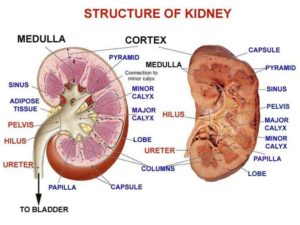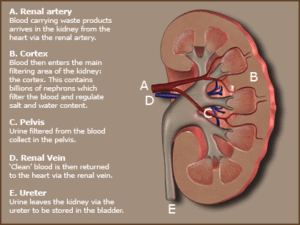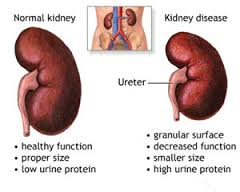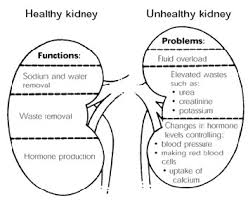Kidney failure occurs when the kidneys lose their ability to function. To treat kidney failure effectively, it is important to know whether kidney disease has developed suddenly (acute) or over the long term (chronic). Many conditions, diseases, and medicines can create situations that lead to acute and chronic kidney disease. Acute kidney injury, also called acute renal failure, is more commonly reversible than chronic kidney failure since the chronic condition has lasted longer in the body affecting systems for several months to years (some decades). Acute Renal Failure is new to the body as opposed to chronic; making it higher odds this can be treated and cured.
When acute kidney injury (ARF) occurs, the kidneys are unable to remove waste products and excess fluids, which then build up in the body and upset the body’s normal chemical balance.*
The most common causes of acute kidney injury are:
-dehydration
-blood loss from major surgery or injury
-medicines such as nonsteroidal anti-inflammatory drugs (NSAIDs), antibiotics, or the dyes (contrast agents) used in X-ray tests.
Symptoms depend on the cause of acute renal failure and can include:
- -Little or no urine output.
- -Dizziness upon standing.
- -Swelling, especially of the legs and feet.
- -Loss of appetite, nausea, and vomiting.
- -Feeling confused, anxious and restless, or sleepy.
- -Pain in the flank, which is felt just below the rib cage and above the waist on one or both sides of the back.*
If your signs and symptoms suggest that you have acute kidney failure, your doctor may recommend certain tests and procedures to verify your diagnosis. These may include:
- Urine output measurements. The amount of urine you excrete in a day may help your doctor determine the cause of your kidney failure.
- Urine tests. Analyzing a sample of your urine, a procedure called urinalysis, may reveal abnormalities that suggest kidney failure.
- Blood tests. A sample of your blood may reveal rapidly rising levels of urea and creatinine — two substances used to measure kidney function. Most cases of acute kidney injury occur in people who are already in the hospital for other reasons. In these people, acute kidney injury is usually diagnosed when routine tests show a sudden increase in creatinine and blood urea nitrogen (BUN) levels. A buildup of these waste products in the blood points to a loss of kidney function!**
- Imaging tests. Imaging tests such as ultrasound and computerized tomography may be used to help your doctor see your kidneys. Also commonly done is an ultrasound of the kidneys which may help determine whether kidney problems are acute or chronic. Normal-sized kidneys may be present in either condition, but when both kidneys are smaller than normal, chronic kidney disease is usually the problem. This helps rule out acute from chronic.–correcting the cause and supporting the kidneys with dialysis until proper functioning is restored.
- Removing a sample of kidney tissue for testing. In some situations, your doctor may recommend a kidney biopsy to remove a small sample of kidney tissue for lab testing. Your doctor inserts a needle through your skin and into your kidney to remove the sample.
TREATMENT FOR ARF (reversible in most cases)
Treatment for acute kidney failure typically requires a hospital stay. Most people with acute kidney failure are already hospitalized. How long you’ll stay in the hospital depends on the reason for your acute kidney failure and how quickly your kidneys recover.
In some cases, you may be able to recover at home.
Treating the underlying cause of your kidney failure
Treatment for acute kidney failure involves identifying the illness or injury that originally damaged your kidneys. Your treatment options depend on what’s causing your kidney failure.
CHRONIC KIDNEY DISEASE (CRF):
In giving a short and easily understandable definition Chronic kidney disease happens when your kidneys no longer filter your blood the way they should, so wastes (toxins, usually end products of an acid) build up in your blood. This has probably been going on for years, and it may keep getting worse over time. Just like a car engine damaged but still using the car without getting the engine repaired sooner or later in time the engine no longer functions the same with any organ of the body getting damaged by some long term condition. If your disease gets worse and worse over time, you could have kidney failure or some multi organ failure, depending on the condition causing this.
Regarding Chronic Kidney Failure the causes can be:
** Diabetes (uncontrolled diabetes (Type 1 or 2) for many years.
** High blood pressure for many years.
These are the top 2 causes of most chronic kidney disease. Controlling these diseases can help slow or stop the damage to the individual’s kidneys who has one of these, if not both.
Other common causes of chronic renal failure include:
-recurring pyelonephritis (kidney infection)
-polycystic kidney disease (multiple cysts in the kidneys
-autoimmune disorders such as systemic lupus erythematosus.
-hardening of the arteries, which can damage blood vessels in the kidney.
-A narrowed or blocked renal artery. A renal artery carries blood to the kidneys. Know this for starters, each of your kidneys has about a million tiny filters, called nephrons. The nephron is the tiny filtering structure in your kidneys. Each of your kidneys contain more than a million tiny filtering nephrons that help clean your blood removing toxins dumping them into your urinary bladder so you can evacuate them though urine (urea, urine; get it). Your nephrons play a vital role to our essential daily living. If over a long time you have a renal artery blocked the nephrons stop their function and die.
Remember the nephrons help all humans do the following if there kidneys or one kidney is functioning properly:
-Remove excess water, wastes (like urea, ammonia, etc.) & other substances from your blood.
-Return substances like sodium, potassium or phosphorus to the body whenever any of these substances run llow in your body or do the opposite if they run high to evacuate them through voiding dumping the sodium or phosphorus or potassium in the urinary bladder through the tube from the kidneys to the urinary bladder called ureters.
**If nephrons are damaged by the high sugar content or high blood pressure in the kidneys, they stop working. For a while, healthy nephrons can take on the extra work or overload. But if the damage continues, more and more nephrons shut down. After a certain point, the nephrons that are left cannot filter your blood well enough to keep you’re blood filtered properly to keep you healthy. Just like running from a bear in the street chancing you. We can run only so long but sooner or later we will run out of energy and not be able to run anymore, same concept for the kidney nephrons when they run out of enough energy due to the kidneys not properly working.**
The symptoms can be:
Urinate less than normal.
Have swelling and weight gain from fluid buildup in your tissues. This is called edema.
Feel very tired or sleepy.
Not feel hungry, or you may lose weight without trying.
Often feel sick to your stomach (nauseated) or vomit.
Have trouble sleeping.
Have headaches or trouble thinking clearly.
So what will you do GO TO A DOCTOR OR CALL 911 AND GO TO THE ER:
Your doctor will do blood and urine tests to help find out how well your kidneys are working. These tests can show signs of kidney disease and anemia. (You can get anemia from having damaged kidneys.) You may have other tests to help rule out other problems that could cause your symptoms.
To diagnose chronic renal failure is pretty much the same tests that are listed above on acute renal failure plus:
Chronic kidney disease is also called chronic renal failure or chronic renal insufficiency.There are five stages of kidney disease, from kidney damage with normal GFR to kidney failure. So GFR will help the MD rule out acute versus chronic to give the MD direction on Rx.Your doctor will ask questions about any past kidney problems. He or she will also ask whether you have a family history of kidney disease and what medicines you take, both prescription and over-the-counter drugs.



